Unit 12 Life is full of the unexpected Section A (3a-3c)课件
文档属性
| 名称 | Unit 12 Life is full of the unexpected Section A (3a-3c)课件 | 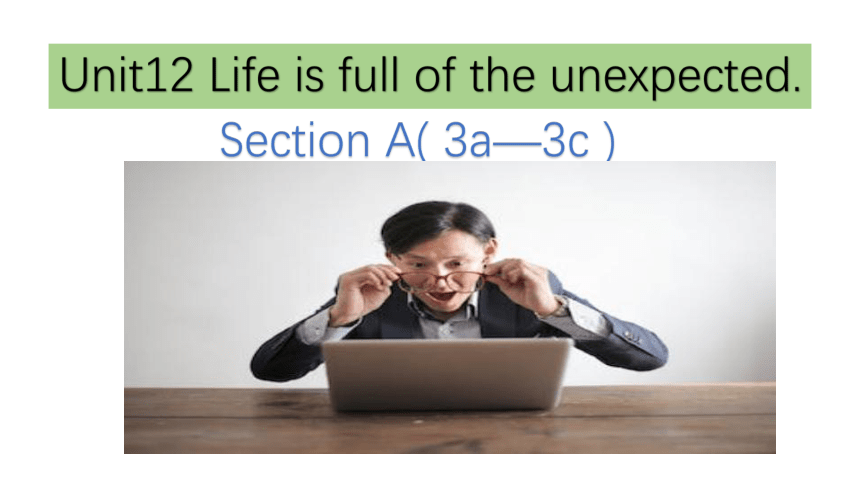 | |
| 格式 | pptx | ||
| 文件大小 | 1.5MB | ||
| 资源类型 | 试卷 | ||
| 版本资源 | 人教新目标(Go for it)版 | ||
| 科目 | 英语 | ||
| 更新时间 | 2023-02-11 08:48:44 | ||
图片预览

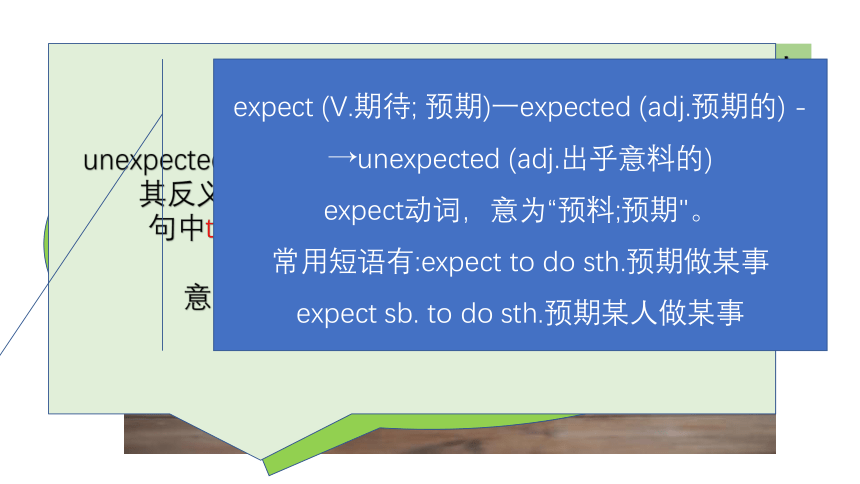


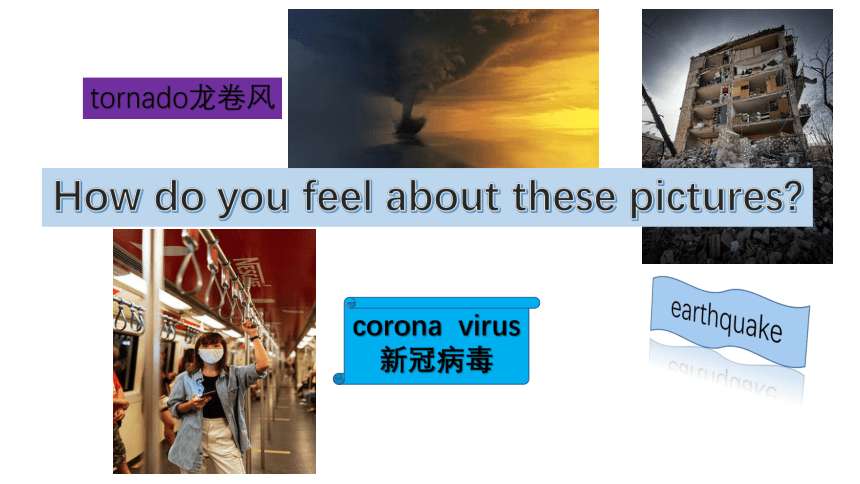
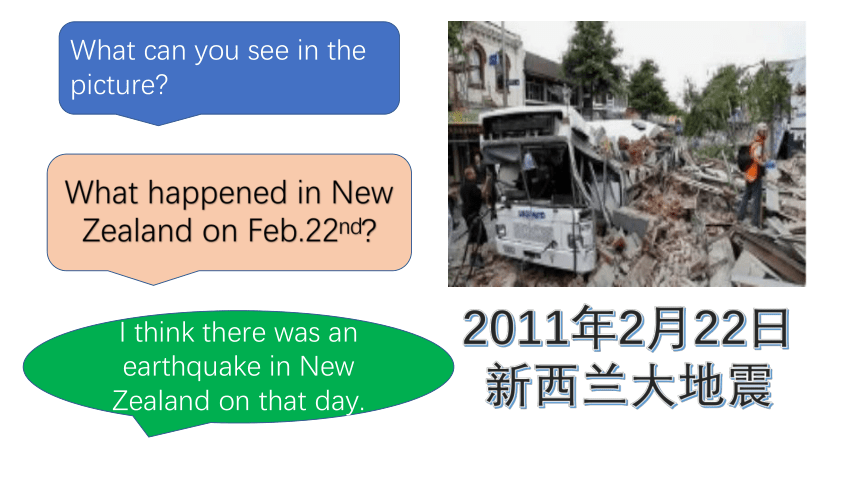
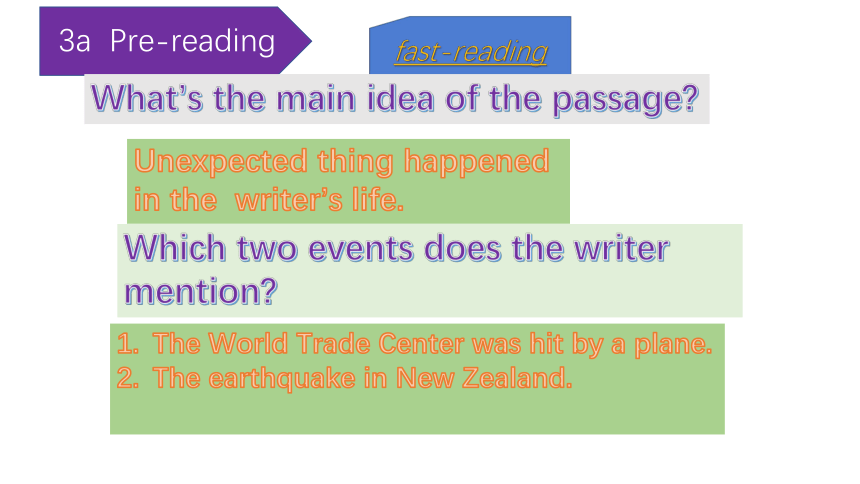
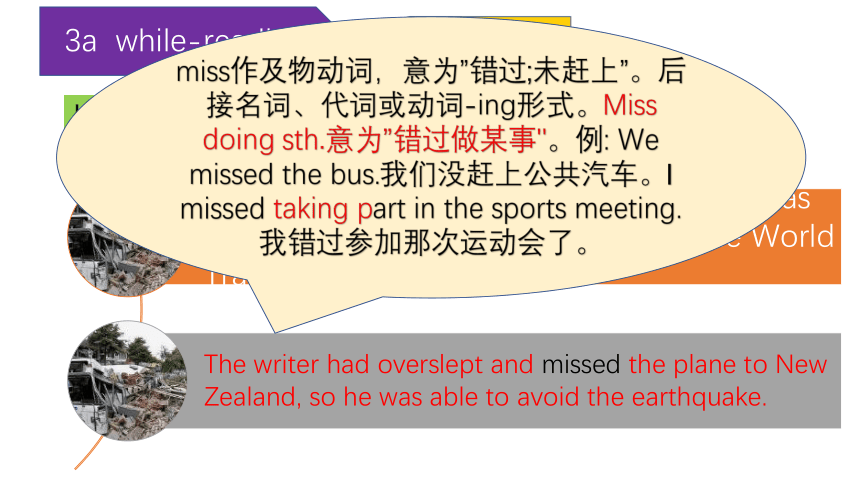
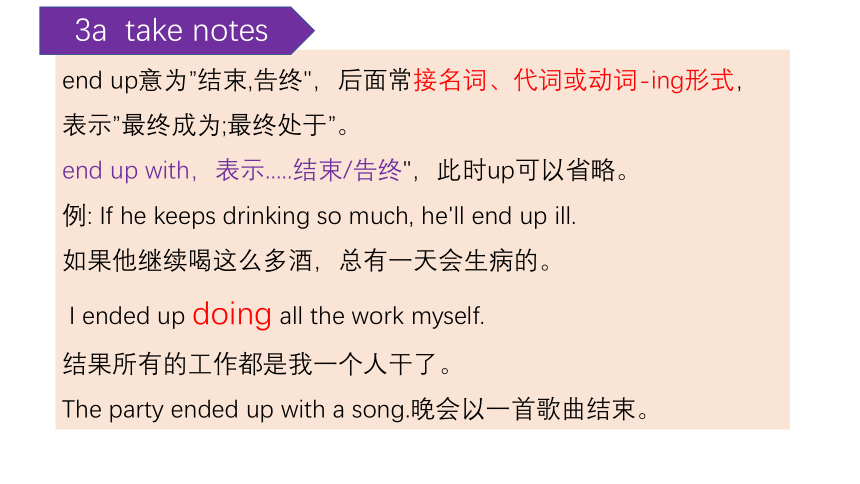
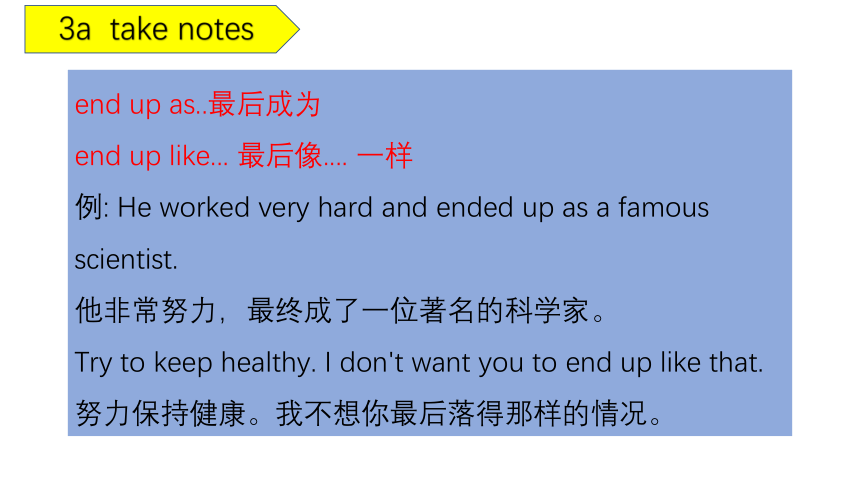
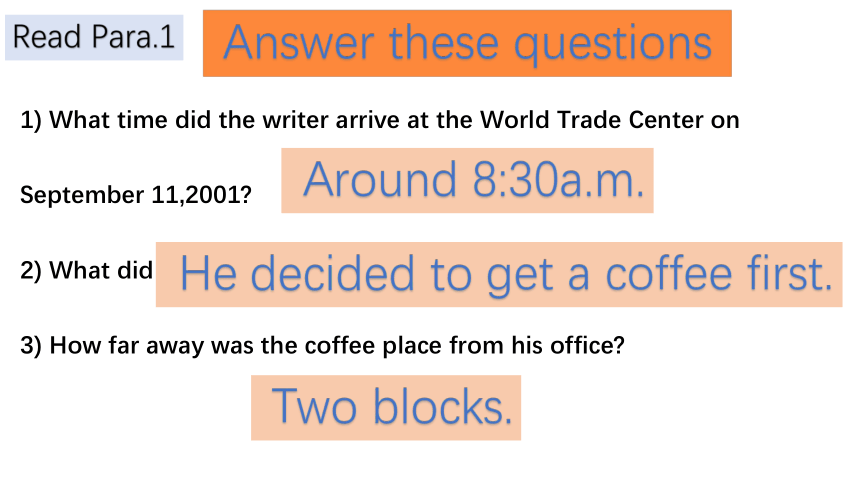
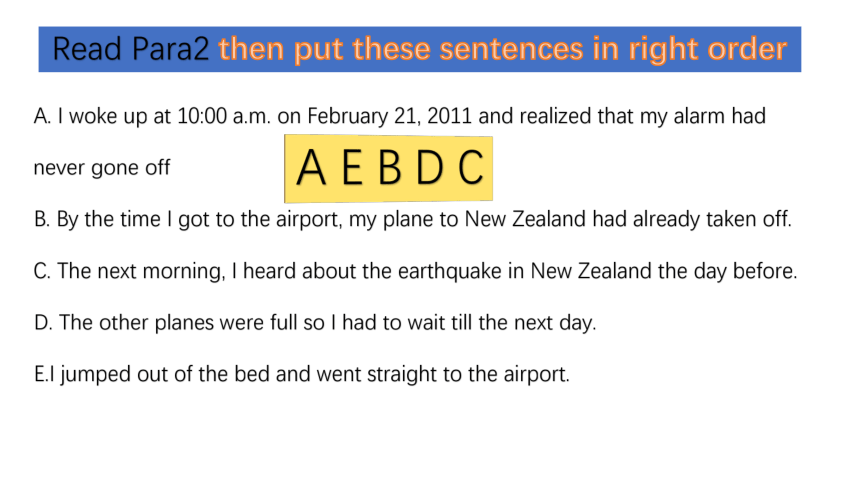
文档简介
(共31张PPT)
Unit12 Life is full of the unexpected.
Section A( 3a—3c )
Unit12 Life is full of the unexpected.
Section A( 3a—3c )
be full of意为“充满;满....。其中full为形容词,意为“满的“
例: The bottle is full of water.瓶子里装满了水。
be full of意为“充满;满.....侧重于状态
be filled with意为“充满;装满",是fill.... with..被动语态形式
例: The room is full of people.房间里挤满了人。
The bottle is filled with sand.瓶子里装满了沙子。
unexpected形容词,意为“出乎意料的;始料不及的",
其反义词为expected,意为"预期的;预料的"。
句中the unexpected为"the+形容词”结构,
在句中起名词的作用,
意为“出乎意料的事;始料不及的事"。
expect (V.期待; 预期)一expected (adj.预期的) - →unexpected (adj.出乎意料的)
expect动词,意为“预料;预期"。
常用短语有:expect to do sth.预期做某事
expect sb. to do sth.预期某人做某事
Learning aims
What happened in the pictures
fire 火灾
volcano eruption火山喷发
flood水灾
tornado龙卷风
earthquake
corona virus新冠病毒
How do you feel about these pictures
2011年2月22日
新西兰大地震
What can you see in the picture
What happened in New Zealand on Feb.22nd
I think there was an earthquake in New Zealand on that day.
3a Pre-reading
fast-reading
What’s the main idea of the passage
Unexpected thing happened
in the writer’s life.
Which two events does the writer mention
The World Trade Center was hit by a plane.
The earthquake in New Zealand.
3a while-reading
How did the writer end up missing both events
fast-reading
miss作及物动词,意为”错过;未赶上”。后接名词、代词或动词-ing形式。Miss doing sth.意为”错过做某事"。例: We missed the bus.我们没赶上公共汽车。I missed taking part in the sports meeting.我错过参加那次运动会了。
end up意为”结束,告终",后面常接名词、代词或动词-ing形式,
表示”最终成为;最终处于”。
end up with,表示.....结束/告终",此时up可以省略。
例: If he keeps drinking so much, he'll end up ill.
如果他继续喝这么多酒,总有一天会生病的。
I ended up doing all the work myself.
结果所有的工作都是我一个人干了。
The party ended up with a song.晚会以一首歌曲结束。
3a take notes
end up as..最后成为
end up like... 最后像.... 一样
例: He worked very hard and ended up as a famous scientist.
他非常努力,最终成了一位著名的科学家。
Try to keep healthy. I don't want you to end up like that.
努力保持健康。我不想你最后落得那样的情况。
3a take notes
1) What time did the writer arrive at the World Trade Center on September 11,2001
2) What did the writer decide to do first
3) How far away was the coffee place from his office
Read Para.1
Answer these questions
Around 8:30a.m.
He decided to get a coffee first.
Two blocks.
A. I woke up at 10:00 a.m. on February 21, 2011 and realized that my alarm had
never gone off
B. By the time I got to the airport, my plane to New Zealand had already taken off.
C. The next morning, I heard about the earthquake in New Zealand the day before.
D. The other planes were full so I had to wait till the next day.
E.I jumped out of the bed and went straight to the airport.
Read Para2 then put these sentences in right order
A E B D C
Incident Date Place How did the writer end up missing both events?
1
2
3a careful reading and finish the chart
The world trade center
was hit by two planes
Earthquake
Sep.11,2001
Feb.22
2011
In New York
He decided to get a coffee first from a coffee place two blocks away.
In
New Zealand
He missed his plane to New Zealand
Life is full of the unexpected
In May 2001, I found a job in New York at the World Trade Center.
On September 11, 2001, I arrived at my building at around 8:30 a.m.
I was about to go up when I decided to get a co ee first.
I went to my favorite co ee place even though it was two blocks east from my o ce.
As I was waiting in line with other o ce workers, I heard a loud sound.
Before I could join the others outside to see what was going on, the first plane had already hit my o ce building. We stared in disbelief at the black smoke rising above the burning building. I felt lucky to be alive.
be about to do sth.意为“即将做某事",
表示即将发生的动作,在时间上指最近的将来,
一般不与具体的时间状语连用,但可与when连用。
例: I was just about to ask you the same thing.
我正要问你同一件事。
I was about to go out when it began to rain.我正要出门时天下起了雨。
go up意为“上升;提高;向上去"。
例: Prices have gone up again.物价又上涨了。
Para.1
In May 2001, I found a job in New York at the World Trade Center.
On September 11, 2001, I arrived at my building at around 8:30 a.m.
I was about to go up when I decided to get a co ee first.
I went to my favorite co ee place even though it was two blocks east from my o ce.
As I was waiting in line with other o ce workers, I heard a loud sound.
Before I could join the others outside to see what was going on, the first plane had already hit my o ce building. We stared in disbelief at the black smoke rising above the burning building. I felt lucky to be alive.
decide及物动词,意为“决定;下决心",
常用结构有: decide sth.“决定某事";decide +to do sth.“决定做某事”; decide + that从句“决定.
例: I can't decide anything at the moment.此刻我不能做出任何决定。He decided to learn medicine.他决定学医。
decide做出一定的选择,强调经过考虑或商议
make up one's mind下定决心,与迟疑、动摇、困惑相对
例: He decided to go on Friday.他决定星期五走。
She made up her mind to study hard.她下定决心要努力学习。
Para.1
In May 2001, I found a job in New York at the World Trade Center.
On September 11, 2001, I arrived at my building at around 8:30 a.m.
I was about to go up when I decided to get a co ee first.
I went to my favorite co ee place even though it was two blocks east from my o ce.
As I was waiting in line with other o ce workers, I heard a loud sound.
Before I could join the others outside to see what was going on, the first plane had already hit my o ce building. We stared in disbelief at the black smoke rising above the burning building. I felt lucky to be alive.
Para.1
wait in line意为“排队等候”,其后接人时,要加介词with,
相当于stand in line,
其反义词组为cut in line,意为"插队”
例: The boy is waiting in line with his classmate.这个男孩儿正和他的同班同学一起排队等候。
stare在此处作不及物动词,意为“盯着看;凝视"。
stare at意为“凝视",为固定短语。
例: What are you staring at
你在看什么
I stared at the paper in front of me.
我盯着面前的那张纸。
In May 2001, I found a job in New York at the World Trade Center.
On September 11, 2001, I arrived at my building at around 8:30 a.m.
I was about to go up when I decided to get a co ee first.
I went to my favorite co ee place even though it was two blocks east from my o ce.
As I was waiting in line with other o ce workers, I heard a loud sound.
Before I could join the others outside to see what was going on, the first plane had already hit my o ce building. We stared in disbelief at the black smoke rising above the burning building. I felt lucky to be alive.
Para.1
disbelief不可数名词,意为”不相信;怀疑",
常用短语in disbelief, 意为“怀疑地;难以置信地”通常在句中作状语。
例: We stared at her in disbelief.
我们疑惑地盯着她。
He listened in disbelief to that surprising story.
他满腹怀疑地听着那个令人惊奇的故事。
above....上面”,表示两者不接触,也不垂直,
与below (.... 下面)相对
on”.....上面”,指两者表面接触,
与beneath (在...下面相对)
over“....正.上方",表示两者垂直,
但不接触,也可指“笼罩/覆盖在上面",
与under (.在..正下方)相对
Life is full of the unexpected
Almost 10 years later, I woke up at 10:00 a.m. on February 21, 2011 and realized that my alarm never went o . I jumped out of bed and went straight to the airport. But by the time I got to the airport, my plane to New Zealand had already taken o . “This is the first holiday I’ve taken in a year, and now I ’ve missed my plane. What bad luck!” I thought to myself. The other planes were full so I had to wait till the next day. The next morning, I heard about the earthquake in New Zealand the day before. My bad luck had unexpectedly turned into a good thing.
本句为what引导的感叹句,后面省略了I had,其中what修饰不可数名词luck。
由what引导的感叹句的结构为:
What (+a/an) +形容词+名词(+主语+谓语) !
例: What hot day (it is)! (这是)多么热的一天呀!
What bad weather (it is)! (这是) 多糟糕的天气呀!
think to oneself意为“心里想;暗自想"。
例: "Who is the captain ” I thought to myself. “
谁是队长 ”我心里想。
含think的其他常见短语:
think about思考
think over认真考虑
think of想出;想起;关心
Para.2
Life is full of the unexpected
Almost 10 years later, I woke up at 10:00 a.m. on February 21, 2011 and realized that my alarm never went o . I jumped out of bed and went straight to the airport. But by the time I got to the airport, my plane to New Zealand had already taken o . “This is the first holiday I’ve taken in a year, and now I ’ve missed my plane. What bad luck!” I thought to myself. The other planes were full so I had to wait till the next day. The next morning, I heard about the earthquake in New Zealand the day before. My bad luck had unexpectedly turned into a good thing.
Para.2
so引导的是一个结果状语从句。可以和because互相替换
,但so和because不能同时用在一个句子中。
例: It was raining outside, so he had to stay at home. = He had to stay at home because it was raining outside.外面下着雨,所以他不得不待在家里。
Unexpectedly adv.意为“出乎意料地”。
unexpected adj. 意为“想不到的,意外的,突然的”。
例: The plan was unexpectedly delayed.
计划意外地延误了。
3b
Find words from the passage with opposite meanings to the words below. Then write a sentence with each word.
1. lost:
2. west:
3. below:
4. dead:
5. empty:
found
alive
east
above
full
3b
Find words from the passage with opposite meanings to the words below. Then write a sentence with each word.
1. I found the pen on the desk.
2. The sun rises in the east.
3. There was a fly (苍蝇) flying above us.
4. He felt lucky when he heard that his son was still alive.
5. The bus was so full that I couldn’t get on the bus at all.
get on 上车
get off 下车
Retell one of the events to your partner. Use these words and phrases to help you.
3c
stare, in disbelief, take off, unexpected, burn, above, alive, till / until,
arrive at, be about to, even though
e.g. On September 11, 2001, I arrived at my…
1._ the time I got to the bus stop, the bus had already left.
On B. In C. By D. With
2. -Show me your homework, Dave.-Sorry, Mrs. Brown. I’ve_ it
at home.
Missed B. forgotten C. lost D. Left
3. We‘re waiting for him, but he hasn’t_ yet.
.A. show up B. shown up C. show around D. showed around
C
D
B
Let’s practice
show sb. around
带领某人参观
show up露面
Let’s practice
4. A big cinema will be built the road next month.
A.by the end of B.at the end of C.in the end of D.in the end
5.-What's this
-It's a present for James. I forgot___ it this morning.
to post B. posting C. post D. posts
6. She kept working it got dark.
A.what B. where C. till D. if
B
A
B
4. B by the end of意为....结来之前”;
at the end of意为.....的末尾;在.的尽头”;
in the end of短语有误;
in the end意为“最后"。
6. 表示“直到.......为止”
用till/until都可。
故选C。
5. A forget to do sth.
意为“忘记要做某事”,指事情还没有做;
forget doing sth.
意为“忘记做过某事”指事情已经做了。
Unit12 Life is full of the unexpected.
Section A( 3a—3c )
Unit12 Life is full of the unexpected.
Section A( 3a—3c )
be full of意为“充满;满....。其中full为形容词,意为“满的“
例: The bottle is full of water.瓶子里装满了水。
be full of意为“充满;满.....侧重于状态
be filled with意为“充满;装满",是fill.... with..被动语态形式
例: The room is full of people.房间里挤满了人。
The bottle is filled with sand.瓶子里装满了沙子。
unexpected形容词,意为“出乎意料的;始料不及的",
其反义词为expected,意为"预期的;预料的"。
句中the unexpected为"the+形容词”结构,
在句中起名词的作用,
意为“出乎意料的事;始料不及的事"。
expect (V.期待; 预期)一expected (adj.预期的) - →unexpected (adj.出乎意料的)
expect动词,意为“预料;预期"。
常用短语有:expect to do sth.预期做某事
expect sb. to do sth.预期某人做某事
Learning aims
What happened in the pictures
fire 火灾
volcano eruption火山喷发
flood水灾
tornado龙卷风
earthquake
corona virus新冠病毒
How do you feel about these pictures
2011年2月22日
新西兰大地震
What can you see in the picture
What happened in New Zealand on Feb.22nd
I think there was an earthquake in New Zealand on that day.
3a Pre-reading
fast-reading
What’s the main idea of the passage
Unexpected thing happened
in the writer’s life.
Which two events does the writer mention
The World Trade Center was hit by a plane.
The earthquake in New Zealand.
3a while-reading
How did the writer end up missing both events
fast-reading
miss作及物动词,意为”错过;未赶上”。后接名词、代词或动词-ing形式。Miss doing sth.意为”错过做某事"。例: We missed the bus.我们没赶上公共汽车。I missed taking part in the sports meeting.我错过参加那次运动会了。
end up意为”结束,告终",后面常接名词、代词或动词-ing形式,
表示”最终成为;最终处于”。
end up with,表示.....结束/告终",此时up可以省略。
例: If he keeps drinking so much, he'll end up ill.
如果他继续喝这么多酒,总有一天会生病的。
I ended up doing all the work myself.
结果所有的工作都是我一个人干了。
The party ended up with a song.晚会以一首歌曲结束。
3a take notes
end up as..最后成为
end up like... 最后像.... 一样
例: He worked very hard and ended up as a famous scientist.
他非常努力,最终成了一位著名的科学家。
Try to keep healthy. I don't want you to end up like that.
努力保持健康。我不想你最后落得那样的情况。
3a take notes
1) What time did the writer arrive at the World Trade Center on September 11,2001
2) What did the writer decide to do first
3) How far away was the coffee place from his office
Read Para.1
Answer these questions
Around 8:30a.m.
He decided to get a coffee first.
Two blocks.
A. I woke up at 10:00 a.m. on February 21, 2011 and realized that my alarm had
never gone off
B. By the time I got to the airport, my plane to New Zealand had already taken off.
C. The next morning, I heard about the earthquake in New Zealand the day before.
D. The other planes were full so I had to wait till the next day.
E.I jumped out of the bed and went straight to the airport.
Read Para2 then put these sentences in right order
A E B D C
Incident Date Place How did the writer end up missing both events?
1
2
3a careful reading and finish the chart
The world trade center
was hit by two planes
Earthquake
Sep.11,2001
Feb.22
2011
In New York
He decided to get a coffee first from a coffee place two blocks away.
In
New Zealand
He missed his plane to New Zealand
Life is full of the unexpected
In May 2001, I found a job in New York at the World Trade Center.
On September 11, 2001, I arrived at my building at around 8:30 a.m.
I was about to go up when I decided to get a co ee first.
I went to my favorite co ee place even though it was two blocks east from my o ce.
As I was waiting in line with other o ce workers, I heard a loud sound.
Before I could join the others outside to see what was going on, the first plane had already hit my o ce building. We stared in disbelief at the black smoke rising above the burning building. I felt lucky to be alive.
be about to do sth.意为“即将做某事",
表示即将发生的动作,在时间上指最近的将来,
一般不与具体的时间状语连用,但可与when连用。
例: I was just about to ask you the same thing.
我正要问你同一件事。
I was about to go out when it began to rain.我正要出门时天下起了雨。
go up意为“上升;提高;向上去"。
例: Prices have gone up again.物价又上涨了。
Para.1
In May 2001, I found a job in New York at the World Trade Center.
On September 11, 2001, I arrived at my building at around 8:30 a.m.
I was about to go up when I decided to get a co ee first.
I went to my favorite co ee place even though it was two blocks east from my o ce.
As I was waiting in line with other o ce workers, I heard a loud sound.
Before I could join the others outside to see what was going on, the first plane had already hit my o ce building. We stared in disbelief at the black smoke rising above the burning building. I felt lucky to be alive.
decide及物动词,意为“决定;下决心",
常用结构有: decide sth.“决定某事";decide +to do sth.“决定做某事”; decide + that从句“决定.
例: I can't decide anything at the moment.此刻我不能做出任何决定。He decided to learn medicine.他决定学医。
decide做出一定的选择,强调经过考虑或商议
make up one's mind下定决心,与迟疑、动摇、困惑相对
例: He decided to go on Friday.他决定星期五走。
She made up her mind to study hard.她下定决心要努力学习。
Para.1
In May 2001, I found a job in New York at the World Trade Center.
On September 11, 2001, I arrived at my building at around 8:30 a.m.
I was about to go up when I decided to get a co ee first.
I went to my favorite co ee place even though it was two blocks east from my o ce.
As I was waiting in line with other o ce workers, I heard a loud sound.
Before I could join the others outside to see what was going on, the first plane had already hit my o ce building. We stared in disbelief at the black smoke rising above the burning building. I felt lucky to be alive.
Para.1
wait in line意为“排队等候”,其后接人时,要加介词with,
相当于stand in line,
其反义词组为cut in line,意为"插队”
例: The boy is waiting in line with his classmate.这个男孩儿正和他的同班同学一起排队等候。
stare在此处作不及物动词,意为“盯着看;凝视"。
stare at意为“凝视",为固定短语。
例: What are you staring at
你在看什么
I stared at the paper in front of me.
我盯着面前的那张纸。
In May 2001, I found a job in New York at the World Trade Center.
On September 11, 2001, I arrived at my building at around 8:30 a.m.
I was about to go up when I decided to get a co ee first.
I went to my favorite co ee place even though it was two blocks east from my o ce.
As I was waiting in line with other o ce workers, I heard a loud sound.
Before I could join the others outside to see what was going on, the first plane had already hit my o ce building. We stared in disbelief at the black smoke rising above the burning building. I felt lucky to be alive.
Para.1
disbelief不可数名词,意为”不相信;怀疑",
常用短语in disbelief, 意为“怀疑地;难以置信地”通常在句中作状语。
例: We stared at her in disbelief.
我们疑惑地盯着她。
He listened in disbelief to that surprising story.
他满腹怀疑地听着那个令人惊奇的故事。
above....上面”,表示两者不接触,也不垂直,
与below (.... 下面)相对
on”.....上面”,指两者表面接触,
与beneath (在...下面相对)
over“....正.上方",表示两者垂直,
但不接触,也可指“笼罩/覆盖在上面",
与under (.在..正下方)相对
Life is full of the unexpected
Almost 10 years later, I woke up at 10:00 a.m. on February 21, 2011 and realized that my alarm never went o . I jumped out of bed and went straight to the airport. But by the time I got to the airport, my plane to New Zealand had already taken o . “This is the first holiday I’ve taken in a year, and now I ’ve missed my plane. What bad luck!” I thought to myself. The other planes were full so I had to wait till the next day. The next morning, I heard about the earthquake in New Zealand the day before. My bad luck had unexpectedly turned into a good thing.
本句为what引导的感叹句,后面省略了I had,其中what修饰不可数名词luck。
由what引导的感叹句的结构为:
What (+a/an) +形容词+名词(+主语+谓语) !
例: What hot day (it is)! (这是)多么热的一天呀!
What bad weather (it is)! (这是) 多糟糕的天气呀!
think to oneself意为“心里想;暗自想"。
例: "Who is the captain ” I thought to myself. “
谁是队长 ”我心里想。
含think的其他常见短语:
think about思考
think over认真考虑
think of想出;想起;关心
Para.2
Life is full of the unexpected
Almost 10 years later, I woke up at 10:00 a.m. on February 21, 2011 and realized that my alarm never went o . I jumped out of bed and went straight to the airport. But by the time I got to the airport, my plane to New Zealand had already taken o . “This is the first holiday I’ve taken in a year, and now I ’ve missed my plane. What bad luck!” I thought to myself. The other planes were full so I had to wait till the next day. The next morning, I heard about the earthquake in New Zealand the day before. My bad luck had unexpectedly turned into a good thing.
Para.2
so引导的是一个结果状语从句。可以和because互相替换
,但so和because不能同时用在一个句子中。
例: It was raining outside, so he had to stay at home. = He had to stay at home because it was raining outside.外面下着雨,所以他不得不待在家里。
Unexpectedly adv.意为“出乎意料地”。
unexpected adj. 意为“想不到的,意外的,突然的”。
例: The plan was unexpectedly delayed.
计划意外地延误了。
3b
Find words from the passage with opposite meanings to the words below. Then write a sentence with each word.
1. lost:
2. west:
3. below:
4. dead:
5. empty:
found
alive
east
above
full
3b
Find words from the passage with opposite meanings to the words below. Then write a sentence with each word.
1. I found the pen on the desk.
2. The sun rises in the east.
3. There was a fly (苍蝇) flying above us.
4. He felt lucky when he heard that his son was still alive.
5. The bus was so full that I couldn’t get on the bus at all.
get on 上车
get off 下车
Retell one of the events to your partner. Use these words and phrases to help you.
3c
stare, in disbelief, take off, unexpected, burn, above, alive, till / until,
arrive at, be about to, even though
e.g. On September 11, 2001, I arrived at my…
1._ the time I got to the bus stop, the bus had already left.
On B. In C. By D. With
2. -Show me your homework, Dave.-Sorry, Mrs. Brown. I’ve_ it
at home.
Missed B. forgotten C. lost D. Left
3. We‘re waiting for him, but he hasn’t_ yet.
.A. show up B. shown up C. show around D. showed around
C
D
B
Let’s practice
show sb. around
带领某人参观
show up露面
Let’s practice
4. A big cinema will be built the road next month.
A.by the end of B.at the end of C.in the end of D.in the end
5.-What's this
-It's a present for James. I forgot___ it this morning.
to post B. posting C. post D. posts
6. She kept working it got dark.
A.what B. where C. till D. if
B
A
B
4. B by the end of意为....结来之前”;
at the end of意为.....的末尾;在.的尽头”;
in the end of短语有误;
in the end意为“最后"。
6. 表示“直到.......为止”
用till/until都可。
故选C。
5. A forget to do sth.
意为“忘记要做某事”,指事情还没有做;
forget doing sth.
意为“忘记做过某事”指事情已经做了。
同课章节目录
- Unit 1 How can we become good learners.
- Section A
- Section B
- Unit 2 I think that mooncakes are delicious!
- Section A
- Section B
- Unit 3 Could you please tell me where the restroom
- Section A
- Section B
- Unit 4 I used to be afraid of the dark.
- Section A
- Section B
- Unit 5 What are the shirts made of?
- Section A
- Section B
- Review of Units 1-5
- Unit 6 When was it invented?
- Section A
- Section B
- Unit 7 Teenagers should be allowed to choose their
- Section A
- Section B
- Unit 8 It must belong to Carla.
- Section A
- Section B
- Unit 9 I like music that I can dance to.
- Section A
- Section B
- Unit 10 You're supposed to shake hands.
- Section A
- Section B
- Review of Units 6-10
- Unit 11 Sad movies make me cry.
- Section A
- Section B
- Unit 12 Life is full of the unexpected
- Section A
- Section B
- Unit 13 We're trying to save the earth!
- Section A
- Section B
- Unit 14 I remember meeting all of you in Grade 7.
- Section A
- Section B
- Review of Units 11-14
